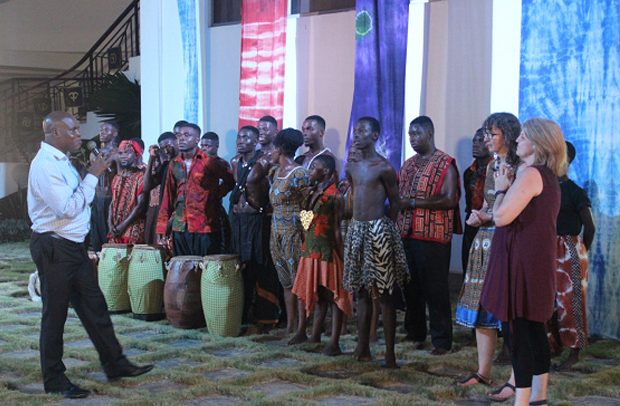Prof. Joseph Teye (First left) speaking at the cultural launch of the research Hub in Accra.
THE CENTRE for Migration, (CMS) University of Ghana (UG) has been selected as the research consortium for the £ 20 million global research on south-south migration, inequality and development hub.
The five-year research funded by the United Kingdom (UK) Research and Innovation (UKRI’s) Global Challenges Research Fund (GCRF) will be led by Coventry University’s Centre for Trust, Peace and Social Relations (CTPSR).
The partnership will see CMS join forces with universities and organizations from across the world to explore how the movement of people in the Global South is affecting inequality and development in less developed regions.
South-South migration is estimated to account for nearly half of all international migration (up to 70 per cent in some places) but its potential benefits have been undermined by limited and unequal access to rights and to the economic and social opportunities that migration can bring.
Professor Joseph Kofi Teye, CMS Director, speaking with the media said the initiative is thought to be the largest study into global migration undertaken anywhere in the world, adding that the research will deal with policy and engagement.
“We are working on the Ghana – China corridor, so we will look at migration from China to Ghana and where the migrants are, we will look at issues of inequalities generated through migration and the benefits of migration,” he added.
Prof. Teye further explained that the project will be working with three main factors including small scale mining, trade and investments in fields like construction.
He said there would be a policy engagement between governments on whether migration is producing inequalities or developments.
“So … we have a policy engagement component that will engage policy makers to see which interventions work better if you want to implement and the benefits of migration … we want to see if we can readopt migration from Ghana to China to promote development and economic growth,” he explained.
Finally, he said the consortium would look at capacity building of researchers, local institutions and some communities at the affected areas of migration.
Professor Heaven Crawley, an expert in international migration at Coventry and lead for the Hub, said the hub was far more than a research project as it brings partners together to try to better understand the nature of movement along the countries of the South.
“A lot of political and policy focus is now on Europe and North America but more people move in the global south adding that inequalities in the global south can mean they cannot move freely, they are exploited and vulnerable so we want to understand how to improve those situations so that migration can contribute to development towards the attainment of the SDGs,” she observed.
She said women, young people and children who are the most affected will be part of the focus as well as how poverty drives migration because it is a fundamental aspect and then how people move or make the decision to move and what the financial consequences are for them and also for their respective countries.
Professor Alison Phipps OBE, UNESCO Chair on Refugee Integration Through Language, said there would be a cultural component of the hub where the outcomes of the research will be communicated through the local language and cultural events.
By Jamila Akweley Okertchiri


